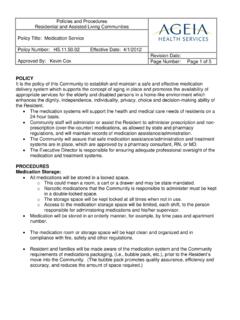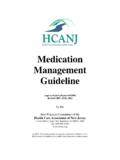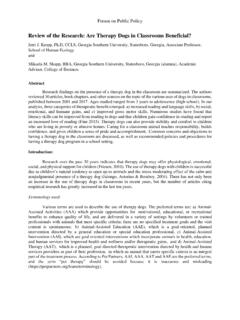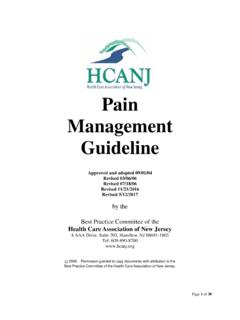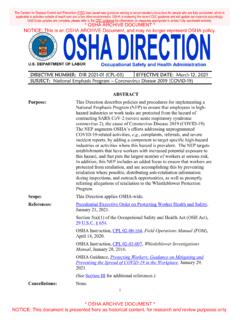Transcription of DDA GROUP HOME POLICIES, PROCEDURES, AND …
1 DDA GROUP HOME POLICIES, procedures , AND OPERATIONS 2014 3/2006;4/2008;6/11;3/12;7/13;9/13;2/14 1 DEVELOPMENTALLY DISABLED ADULT (DDA) GROUP HOME POLICIES, procedures , AND OPERATIONS Purpose Persons with intellectual and developmental disabilities have the inherent right to fulfill their potential as human beings and can be helped to lead dignified lives regardless of their level of functioning. The GROUP home was created to assist eligible persons to realize that potential, to provide an alternative to institutionalization, and to provide the necessary level of care and services for eligible individuals to live in and/or near their home communities. Policy 1. Both Harrison Avenue GROUP Home and the Yonce House are operated by Macon Citizens Habilities, Inc.
2 , and each is referred to herein as the GROUP home. 2. This GROUP home provides adults with intellectual and developmental disabilities who are eligible for DDA level of care and are suitable for small- GROUP living in a community setting with residential placement. 3. The GROUP home is licensed under NC General Statute 122 (c) to serve 6 clients at Harrison Avenue and 3 clients at Yonce House. Both homes are located on Harrison Avenue in Franklin, NC. 4. First priority is given to citizens of Macon, Jackson, Swain, Clay, Cherokee, Graham, and Haywood Counties; however, MCH will take referrals from other counties as well. 5. Clients of the DDA GROUP home are restricted to 45 nights out of the GROUP home annually and 15 nights per quarter not to exceed 45 in a year. Longer absences may jeopardize placement.
3 6. Clients and families are made aware of provider choice at least annually. 7. Each home serves clients who are eligible for NC Innovations funding or GROUP Home Moderate funding, if available. 8. NC Innovations addresses the needs of individuals in their community, insures person-centered planning for each individual, provides for simplicity and ease of service delivery, promotes movement of individuals to the community from intermediate care facility for persons with intellectual and developmental disabilities (ICF-IID) GROUP homes and state developmental centers, and is a Medicaid community care funding source for persons with intellectual and developmental disabilities. It offers specific services in the community for individuals of all ages who require an ICF-IID level of care and gives a cost-effective alternative to care in an ICF-IID.
4 9. MCH is responsible for maintaining a current license to operate, internal quality improvement plans, and maintaining a client s rights committee. procedures 1. The GROUP home provides services according to the principles of normalization and person-centered planning with a positive, person-centered approach to habilitation. 2. Persons with intellectual and developmental disabilities may be considered for NC Innovations funding and placement in the GROUP home if all of the following criteria are met: (a) The individual meets the requirements for ICF-IID level of care. (b) The individual is eligible for Medicaid or will be eligible for Medicaid under the NC Innovations eligibility criteria. (c) The individual resides in an ICF-IID facility or is at high risk of being placed in an ICF-IID facility. (d) The individual s health, safety and well-being can be maintained in the community under the program.
5 (e) The individual requires NC Innovations services, based on medical necessity criteria, as identified through a family or person-centered planning process. An individual must require at least 1 waiver service as identified in the person-centered planning process and indicated in the Plan of Care and Cost Summary. 3/2006;4/2008;6/11;3/12;7/13;9/13;2/14 2 (f) The person-centered planning process assists the individual with their family or guardian in identifying and accessing a personalized mix of paid and non-paid services that will assist him/her to achieve personally defined outcomes in the most inclusive community setting. (g) The individual, his/her family, and/or guardian desire NC Innovations participation rather than institutional services.
6 3. Persons may also be considered for placement if GROUP home moderate state funds are available. 4. Each state funded individual will have a PCP which includes a crisis plan. The plan is written and monitored by the QP. 5. The GROUP home promotes a family-like atmosphere and provides the training necessary to help each client become as independent as possible. Each client is assisted to develop skills which allow for self-sufficiency, independence, and social acceptance in the community. 6. Each client who lives in the GROUP home and/or the representative/legal guardian must enter into an agreement or contract for services with MCH. 7. At least annually provider choice will be reviewed with clients and guardians. If a change is desired, assistance will be offered to find a more suitable provider. 8. At least annually and any time there are updates, each DDA client receives an updated Client Handbook which describes the services, policies and procedures of the home as well as several consents for services.
7 See DDA Attachment 1 DDA Client Handbook 3/2006;4/2008;6/11;3/12;7/13;9/13;2/14 3 HOUSE RULES* ALL RESIDENTS MUST OBEY THE FOLLOWING RULES: 1. Respect the rights of your housemates. 2. Participate in activities and training unless I am ill or have a very good reason. 3. Help take care of my home and keep it neat and clean. 4. Do not smoke or use other tobacco products in the GROUP home. 5. Get ready for bed at a reasonable hour so I do not disturb others. 6. Be considerate of others at night if I stay up late. 7. Respect the property of my housemates. Do not take nor destroy their things. 8. Do not go into the rooms of my housemates unless they invite me in. 9. Do not go into the administrative area unless the manager invites me in.
8 10. Do not go outside the GROUP home after dark unless I ask for permission first. 11. Do not drink alcoholic beverages in the GROUP home. *Violation of any of these rules may result in the loss of GROUP home privileges such as outings, participation in special events, shopping, eating out, etc. Continued violation could result in loss of placement. 3/2006;4/2008;6/11;3/12;7/13;9/13;2/14 4 ADMISSIONS/DISCHARGE Policy 1. All applicants must: (a) Submit a complete application including required attachments. (b) Be approved by the MCH Admissions Committee prior to admission and authorized by the MCO. (c) Have a funding source or be eligible for a funding source. See DDA Attachment 2 -- Application for Admission to DDA GROUP Home 2.
9 The GROUP home serves individuals who meet the following criteria: (a) intellectual and developmental disabilities (b) eligible for ICF-IID level of care as documented on an MR 2 approved by a physician or clinical psychologist (c) resident of the state of NC (d) at least 21 years of age or older (Harrison Avenue) or 18 years of age or older (Yonce House) (e) ambulatory if applying to Harrison Avenue (f) ambulatory or transfer skills if applying to Yonce House (g) basic toileting and self-feeding skills 3. Applicants are screened based on at least 3 deficits in level of care or the NC SNAP and ICF-IID level of care. The level of care should include an IDD diagnosis. Other evaluations such as psychological and intelligence tests may also be used in screening. 4. In order to be meet LOC, the applicant is screened to determine if he/she meets the following criteria: (a) have a diagnosis of intellectual and developmental disabilities (per the Diagnostic and Statistical Manual on Mental Disorders, fourth edition, text revision (DSM-V-TR), Intelligence Quotient (IQ) test results indicating intellectual and developmental disabilities, or (b) (b) a condition that is closely related to intellectual and developmental disabilities.)
10 Intellectual and developmental disabilities is a disability characterized by significant limitations both in general intellectual function resulting in, or associated with, deficits or impairments in adaptive behavior. The disability must manifest before age 18. Persons with closely related conditions refers to individuals who have a severe, chronic disability that meets ALL of the following conditions: a. is attributable to cerebral palsy, epilepsy; or any other condition, other than mental illness, found to be closely related to intellectual and developmental disabilities because this condition results in impairment of general intellectual functioning or adaptive behavior similar to that of mentally retarded persons, and requires treatment or services similar to those required for these persons. The related condition manifested before age 22 and is likely to continue indefinitely and have intellectual and developmental disabilities or a related condition resulting in substantial functional limitations in three or more of the following major life activity areas (1) self-care (ability to take care of basic life needs for food, hygiene, and appearance), (2) understanding and use of language (ability to both understand others and to express ideas or information to others either verbally or non-verbally), (3) learning (ability to acquire new behaviors, perceptions and information, and to apply experiences to new situations).
